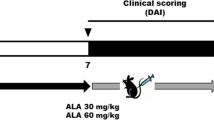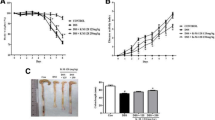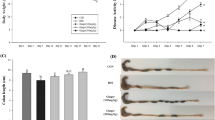Abstract
Background
In ulcerative colitis (UC), reduction of inflammation may represent a key mechanism in UC therapy, and anti-inflammatory agents would be good candidates for preventing UC. Kaempferol, a natural flavonoid, is believed to have anti-inflammatory activities and has been shown to be potentially immune-modulatory.
Aims
The aim of this study was to determine whether kaempferol alleviates the inflammatory responses of dextran sulfate sodium (DSS)-induced colitis in mice.
Methods
Female C57BL/6J mice were divided into six groups: a negative control group, a DSS control group, and DSS + 0.1% or 0.3% kaempferol pre- or post-fed groups. At the end of the experimental period, clinical and biochemical markers were evaluated.
Results
Plasma levels of NO and PGE2 were significantly decreased in both the 0.3% kaempferol pre- and post-fed groups. The plasma LTB4 level was profoundly decreased in all animals fed kaempferol. Colonic mucosa MPO activity was also suppressed in both the 0.3% kaempferol pre- or post-fed groups. TFF3 mRNA, a marker for goblet cell function, was up-regulated in kaempferol pre-fed animals.
Conclusions
These results indicate that kaempferol is an effective anti-inflammatory agent that protects colonic mucosa from DSS-induced UC. Dietary kaempferol fed prior to colitis induction was more effective to suppress some of the colitis-associated markers.






Similar content being viewed by others
References
Caprilli R, Angelucci E, Cocco A, et al. Efficacy of conventional immunosuppressive drugs in IBD. Dig Liver Dis. 2004;36:766–780.
Sandborn WJ. Strategies for targeting tumour necrosis factor in IBD. Best Pract Res Clin Gastroenterol. 2003;17:105–117.
Geier MS, Butler RN, Howarth GS. Inflammatory bowel disease: current insights into pathogenesis and new therapeutic options; probiotics, prebiotics and synbiotics. Int J Food Microbiol. 2007;115:1–11.
Holma R, Salmenperä P, Virtanen I, et al. Prophylactic potential of montelukast against mild colitis induced by dextran sulphate sodium in rats. J Physiol Pharmacol. 2007;58:455–467.
Kwon HS, Oh SM, Kim JK. Glabridin, a functional compound of liquorice, attenuates colonic inflammation in mice with dextran sulphate sodium-induced colitis. Clin Exp Immunol. 2008;151:165–173.
Havsteen BH. The biochemistry and medical significance of the flavonoids. Pharmacol Ther. 2002;96:67–202.
Middleton E, Kandaswami C, Theoharides TC. The effects of plant flavonoids on mammalian cells: implications for inflammation, heart disease, and cancer. Pharmacol Rev. 2000;52:673–751.
Hämäläinen M, Nieminen R, Vuorela P, et al. Antiinflammatory effects of flavonoids: genistein, kaempferol, quercetin, and daidzein inhibit STAT-1 and NF-κB activations, whereas flavone, isorhamnetin, naringenin, and pelargonidin inhibit only NF-κB activation along with their inhibitory effect on iNOS expression and nitric oxide production in activated macrophages. Mediat Inflamm. 2007;2007:45673.
Park MY, Kwon HJ, Sung MK. Evaluation of aloin and aloe-emodin as anti-inflammatory agents in aloe by using murine macrophages. Biosci Biotechnol Biochem. 2009;73:828–832.
Cho EY, Choi SC, Lee SH, et al. Nafamostat mesilate attenuates colonic inflammation and mast cell infiltration in the experimental colitis. Int Immunopharmacol. 2011;11:412–427.
Crespo I, García-Mediavilla MV, Gutiérrez B, et al. A comparison of the effects of kaempferol and quercetin on cytokine-induced pro-inflammatory status of cultured human endothelial cells. Br J Nutr. 2008;100:968–976.
Sánchez-Fidalgo S, Cárdeno A, Villegas I, et al. Dietary supplementation of resveratrol attenuates chronic colonic inflammation in mice. Eur J Pharmacol. 2010;633:78–84.
Hanai H, Sugimoto K. Curcumin has bright prospects for the treatment of inflammatory bowel disease. Curr Pharm Des. 2009;15:2087–2094.
Cooper HS, Murthy SN, Shah RS, et al. Clinicopathologic study of dextran sulfate sodium experimental murine colitis. Lab Invest. 1993;69:238–249.
Krawisz JE, Sharon P, Stenson WF. Quantitative assay for acute intestinal inflammation based on myeloperoxidase activity. Assessment of inflammation in rat and hamster models. Gastroenterology. 1984;87:1344–1350.
Babyatsky M, Lin J, Yio X, et al. Trefoil factor-3 expression in human colon cancer liver metastasis. Clin Exp Metastasis. 2009;26:143–151.
Naito Y, Uchiyama K, Kuroda M, et al. Role of pancreatic trypsin in chronic esophagitis induced by gastroduodenal reflux in rats. J Gastroenterol. 2006;41:198–208.
Nakao A, Moore BA, Murase N, et al. Immunomodulatory effects of inhaled carbon monoxide on rat syngeneic small bowel graft motility. Gut. 2003;52:1278–1285.
Yang SK, Loftus EV, Sandborn WJ. Epidemiology of inflammatory bowel disease in Asia. Inflamm Bowel Dis. 2001;7:260–270.
Yang SK, Song IS, Kim YH. Epidemiology of inflammatory bowel disease in the Songpa-Kangdong district, Seoul, Korea, 1986–2001: a KASID study. Gastroenterology. 2003;124:A210.
Louis E, Belaiche J, Reenaers C. Are we giving biologics too much time? When should we stop treatment? World J Gastroenterol. 2008;14:5528–5531.
Shapiro H, Singer P, Halpern Z, et al. Polyphenols in the treatment of inflammatory bowel disease and acute pancreatitis. Gut. 2007;56:426–435.
Joo YE, Karrasch T, Mühlbauer M, et al. Tomato lycopene extract prevents lipopolysaccharide-induced NF-kappaB signaling but worsens dextran sulfate sodium-induced colitis in NF-kappaBEGFP mice. PLoS One. 2009;4:e4562.
Hicks A, Monkarsh SP, Hoffman AF, et al. Leukotriene B4 receptor antagonists as therapeutics for inflammatory disease: preclinical and clinical developments. Expert Opin Investig Drugs. 2007;16:1909–1920.
Huang XL, Xu J, Zhang XH et al. PI3K/Akt signaling pathway is involved in the pathogenesis of ulcerative colitis. Inflamm Res. 2011.
Regasini LO, Vellosa JC, Silva DH, et al. Flavonols from Pterogyne nitens and their evaluation as myeloperoxidase inhibitors. Phytochemistry. 2008;69:1739–1744.
Kanashiro A, Souza JG, Kabeya LM, et al. Elastase release by stimulated neutrophils inhibited by flavonoids: importance of the catechol group. Z Naturforsch C. 2007;62:357–361.
Sharma JN, Mohammed LA. The role of leukotrienes in the pathophysiology of inflammatory disorders: is there a case for revisiting leukotrienes as therapeutic targets? Inflammopharmacology. 2006;14:10–16.
Singh VP, Patil CS, Jain NK, et al. Effect of nimesulide on acetic acid- and leukotriene-induced inflammatory bowel disease in rats. Prostaglandins Other Lipid Mediat. 2003;71:163–175.
Sheibanie AF, Yen JH, Khayrullina T, et al. The proinflammatory effect of prostaglandin E2 in experimental inflammatory bowel disease is mediated through the IL-23– > IL-17 axis. J Immunol. 2007;178:8138–8147.
Jiang GL, Nieves A, Im WB, et al. The prevention of colitis by E Prostanoid receptor 4 agonist through enhancement of epithelium survival and regeneration. J Pharmacol Exp Ther. 2007;320:22–28.
Leslie EM, Mao Q, Oleschuk CJ, et al. Modulation of multidrug resistance protein 1 (MRP1/ABCC1) transport and ATPase activities by interaction with dietary flavonoids. Mol Pharmacol. 2001;59:1171–1180.
Lättig J, Böhl M, Fischer P, et al. Mechanism of inhibition of human secretory phospholipase A2 by flavonoids: rationale for lead design. J Comput Aided Mol Des. 2007;21:473–483.
Kawanishi S, Hiraku Y, Pinlaor S, et al. Oxidative and nitrative DNA damage in animals and patients with inflammatory diseases in relation to inflammation-related carcinogenesis. Biol Chem. 2006;387:365–372.
Kruidenier L, Kuiper I, Lamers CB, et al. Intestinal oxidative damage in inflammatory bowel disease: semi-quantification, localization, and association with mucosal antioxidants. J Pathol. 2003;201:28–36.
Hoffmann W. TFF (trefoil factor family) peptides and their potential roles for differentiation processes during airway remodeling. Curr Med Chem. 2007;14:2716–2719.
Feng ZM, Fang DC, Chen WS, et al. Rodent IRR-219 (IgGFcgammaBP) and rTFF3, expressed mainly in the intestinal mucosa, depleted during dextran sulfate sodium-induced colitis. Dig Dis Sci. 2007;52:2104–2112.
Hahm KB, Im YH, Parks TW, et al. Loss of transforming growth factor beta signalling in the intestine contributes to tissue injury in inflammatory bowel disease. Gut. 2001;49:190–198.
Podolsky DK, Gerken G, Eyking A, Cario E. Colitis-associated variant of TLR2 causes impaired mucosal repair because of TFF3 deficiency. Gastroenterology. 2009;137:209–220.
Fink BN, Steck SE, Wolff MS, et al. Dietary flavonoid intake and breast cancer risk among women on Long Island. Am J Epidemiol. 2007;165:514–523.
Acknowledgments
This work was supported by the Korean Ministry of Health and Welfare Grant number A06-0546-AD-1101-06-N1-00020B and by the Basic Science Research Program through the National Research Foundation of Korea (NRF) funded by the Ministry of Education, Science and Technology (2010-0001886).
Author information
Authors and Affiliations
Corresponding author
Rights and permissions
About this article
Cite this article
Park, MY., Ji, G.E. & Sung, MK. Dietary Kaempferol Suppresses Inflammation of Dextran Sulfate Sodium-Induced Colitis in Mice. Dig Dis Sci 57, 355–363 (2012). https://doi.org/10.1007/s10620-011-1883-8
Received:
Accepted:
Published:
Issue Date:
DOI: https://doi.org/10.1007/s10620-011-1883-8




